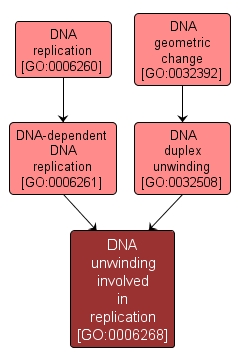GO TERM SUMMARY
|
| Name: |
DNA unwinding involved in replication |
| Acc: |
GO:0006268 |
| Aspect: |
Biological Process |
| Desc: |
The process by which interchain hydrogen bonds between two strands of DNA are broken or 'melted', generating unpaired template strands for DNA replication. |
Synonyms:
- DNA unwinding during replication
- DNA unwinding factor
|
|

|
INTERACTIVE GO GRAPH
|














